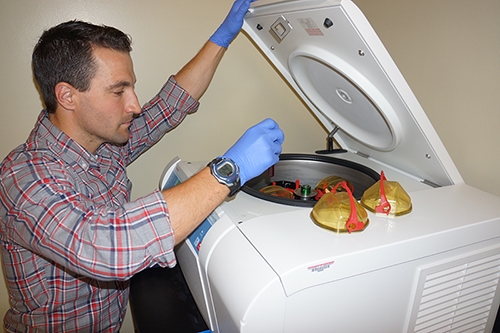Members of the Hydration Science Laboratory at the University of Arkansas showed that the illustrated seven-day fluid diary tested in a research project at the U of A is a valid and reliable method to estimate daily water intake. The Journal of Nutrition recently published their findings.
In nutrition science, it is difficult to validate questionnaires because there are no truly objective ways to assess what people eat and drink, unless you have 24-hour-a-day surveillance, said Stavros Kavouras, a professor of kinesiology who directs the lab.
"What is interesting with water intake is that there is an objective method to measure true water intake by using a stable isotopic version of water (deuterium oxide)," Kavouras said. "This method is great, but expensive to be used even for research. Our study is the first that validates a tool to assess water intake compared with this gold standard of deuterium oxide."
One of the reasons that even large epidemiological studies do not record water intake is the lack of validated questionnaires. Kavouras said he is currently using this tool in a large study to record water intake of people around the world.
In 2015, he published a series of papers about water intake from 13 countries and he is now working on a larger study with more countries and several tens of thousands of volunteers.
"The World Health Organization is using our data to assess how much water people from different countries drink," Kavouras said.
The article is titled "Validation Testing Demonstrates Efficacy of a 7-Day Fluid Record to Estimate Daily Water Intake in Adult Men and Women When Compared with Total Body Water Turnover Measurement."
A test is valid if it measures what it is supposed to measure. A test is reliable if other researchers using the same conditions can duplicate its results.
Evan Johnson, now an assistant professor at the University of Wyoming, led the data collection in 2014 when he was completing a post-doctoral research fellowship under Kavouras at the U of A. Other co-authors of the article are Lisa Jansen, a doctoral student; J.D. Adams, a recent graduate of the program now working at the Mayo Clinic; Catalina Capitan who was a visiting scholar from Costa Rica; and colleagues from Canada and France.
Men and women who participated in the study recorded all drinks that they drank, including plain water, in their seven-day diaries, as well as the type and amount of food they ate, allowing researchers to calculate the fluid contained in their food. On three visits to the lab in the HPER building on campus, participants drank a dose of heavy water, which contains a larger amount than normal of a hydrogen isotope (deuterium), giving it different physical and chemical properties than normal water. The participants then provided urine and blood samples that were analyzed to compare the time it took for the body to eliminate the heavy water, and that data could be compared with the data from the fluid records to determine the diary's accuracy.
"Eventually, the use of methods that have data available to represent their validity and reliability could lead to the establishment of a recommended daily allowance for water in North America and consensus among other countries," the article said.
Topics
Contacts
Heidi S. Wells, director of communications
College of Education and Health Professions
479-575-3138,
